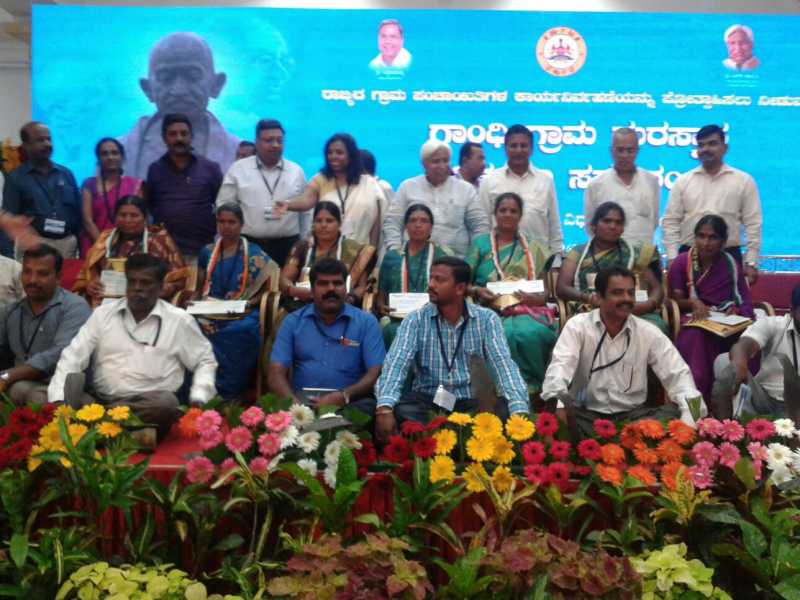- Forum
- categories
- Markets, finance and governance
- Government initiatives and regulations
- Indian Government initiatives: Swachh Bharat Abhiyan (SBA or SBM) and others
- Introspecting the Sanitation Schemes being implemented in Mysore District (India)
Introspecting the Sanitation Schemes being implemented in Mysore District (India)
7150 views
- srinidhi87
-
Less
- Posts: 3
- Likes received: 0
Re: Introspecting the Sanitation Schemes being implemented in Mysore District (India)
Baby Steps to end open defecation:
To achieve Open Defecation Free (ODF) Country, all stakeholders must be engaged at the grass root level. ODF society starts from school and teachers play an important role in inculcating clean & hygienic practices amongst children.
One of such engagements and good practices can be seen in Thumnerale Gram Panchayat, Nanjangud Taluk, Mysore District, where the Department of Women and Child Development and Zilla Panchayat, Mysore District has jointly built an Anganwadi (Child Day Care Centre) under Integrated Child Development Scheme which has child friendly toilets.
Such Anganwadis discourage children from open defecating and train how to use toilets from a tender age of 2 years. Children are also taught good hygiene practices like washing hands with soap before & after meals and after toilet usage.
Thumnerale GP has shown the way for other Gram Panchayats to emulate.
To achieve Open Defecation Free (ODF) Country, all stakeholders must be engaged at the grass root level. ODF society starts from school and teachers play an important role in inculcating clean & hygienic practices amongst children.
One of such engagements and good practices can be seen in Thumnerale Gram Panchayat, Nanjangud Taluk, Mysore District, where the Department of Women and Child Development and Zilla Panchayat, Mysore District has jointly built an Anganwadi (Child Day Care Centre) under Integrated Child Development Scheme which has child friendly toilets.
Such Anganwadis discourage children from open defecating and train how to use toilets from a tender age of 2 years. Children are also taught good hygiene practices like washing hands with soap before & after meals and after toilet usage.
Thumnerale GP has shown the way for other Gram Panchayats to emulate.
Attachments:
-
IMG_2876.JPG (Filesize: 41KB)
-
IMG_2883.JPG (Filesize: 34KB)
Please Log in to join the conversation.
You need to login to reply- arpithamv02
-
Less
- Posts: 2
- Likes received: 1
Re: Introspecting the Sanitation Schemes being implemented in Mysore District (India)
Model Gram Panchayat at Mysore: By the people, For the people.
One of the Gram Panchayat’s priorities is community involvement for providing better governance. Such an example can be seen in Srirampura Gram Panchayat of Mysore Taluk. The GP has adopted a unique system for Tax Collection & Documentation and unique strategy for Sanitation Coverage.
Model Sanitation System:
Srirampura GP has been awarded Nirmal Gram Puraskar (An Award given by Central Government) for achieving 100% coverage for IHHL in the year 2012 under Nirmal Bharat Abhiyan scheme which is now called Swacch Bharat Mission and Nirmal Gram Puraskar has now been renamed as Gandhi Gram Puraskar.
For a GP to be an awardee of Gandhi Gram Puraskar, it has to focus on not just Individual Household Latrines but also on 32 other criteria under different heads, which is developed by Government of India. Sanitation and Hygiene head includes:
1. Individual Household Latrines coverage (%)
2. Basic Amenities provided for rural population – Clean & Safe Drinking Water and Sanitation & Hygiene
3. Sanitation: Under Ground Drainage (UGD) System – Construction and Management, Provision of dust bins in the rural areas, comprehensive waste management and
4. Solid Waste Management
Srirampura GP has been awarded Gandhi Gram Puraskar in October, 2015 for its incredible efforts and hard work in sensitizing people about sanitation & hygiene and moving towards ODF+.
One of the Gram Panchayat’s priorities is community involvement for providing better governance. Such an example can be seen in Srirampura Gram Panchayat of Mysore Taluk. The GP has adopted a unique system for Tax Collection & Documentation and unique strategy for Sanitation Coverage.
Model Sanitation System:
Srirampura GP has been awarded Nirmal Gram Puraskar (An Award given by Central Government) for achieving 100% coverage for IHHL in the year 2012 under Nirmal Bharat Abhiyan scheme which is now called Swacch Bharat Mission and Nirmal Gram Puraskar has now been renamed as Gandhi Gram Puraskar.
For a GP to be an awardee of Gandhi Gram Puraskar, it has to focus on not just Individual Household Latrines but also on 32 other criteria under different heads, which is developed by Government of India. Sanitation and Hygiene head includes:
1. Individual Household Latrines coverage (%)
2. Basic Amenities provided for rural population – Clean & Safe Drinking Water and Sanitation & Hygiene
3. Sanitation: Under Ground Drainage (UGD) System – Construction and Management, Provision of dust bins in the rural areas, comprehensive waste management and
4. Solid Waste Management
Srirampura GP has been awarded Gandhi Gram Puraskar in October, 2015 for its incredible efforts and hard work in sensitizing people about sanitation & hygiene and moving towards ODF+.
Attachments:
-
 IMG-201510...0003.jpg
(Filesize: 60KB)
IMG-201510...0003.jpg
(Filesize: 60KB)
Please Log in to join the conversation.
You need to login to reply- srinidhi87
-
Less
- Posts: 3
- Likes received: 0
Re: Introspecting the Sanitation Schemes being implemented in Mysore District (India)
Dear all,
Karnataka Government is promoting good hygiene practices using short advertisements on sanitation using television as a medium to reach maximum population in the State.
Karnataka Government is promoting good hygiene practices using short advertisements on sanitation using television as a medium to reach maximum population in the State.
Please Log in to join the conversation.
You need to login to reply- srinidhi87
-
Less
- Posts: 3
- Likes received: 0
Re: Introspecting the Sanitation Schemes being implemented in Mysore District (India)
"Having toilet in individual homes is a sign of culture. We are making expenses on unnecessary appliances and gadgets whereas we are not concentrating on having basic amenities which is much more essential. This message has to reach all the households that are not having toilets through public awareness, educating children in schools etc".
---Mr.Somaiah, Panchayath Development Officer (Implementing Officer at Village level), Mysore taluk.
Mr.Somaiah has successfully implemented sanitation schemes at Srirampura Gram Panchayath, Mysore Taluk through various IEC (Information,Education and Counselling) programmes.
---Mr.Somaiah, Panchayath Development Officer (Implementing Officer at Village level), Mysore taluk.
Mr.Somaiah has successfully implemented sanitation schemes at Srirampura Gram Panchayath, Mysore Taluk through various IEC (Information,Education and Counselling) programmes.
Please Log in to join the conversation.
You need to login to reply- arpithamv02
-
Less
- Posts: 2
- Likes received: 1
Re: Introspecting the Sanitation Schemes being implemented in Mysore District (India)
Dear All,
Greetings from IIWM!
We are happy to inform you all that the focus group discussion held on 8th of September 2015 in Mysore District was very effective. It served as a platform where in all the delegates joined together to share their field level experiences and also were able to flag the sanitation implementation hurdles.
The group was engaged in the discussion regarding the following topics:
1. Data inconsistency in the Baseline Survey 2012.
2. What are the criteria for Beneficiary Identification?
3. List the necessary beneficiary documents required and why?
4. What are the bottle necks in sanitation scheme implementation and possible solutions?
A WhatsApp group has been created involving all the delegates who were present during the discussion forum to share their case studies, best practices and also scheme implementation hurdles.
Greetings from IIWM!
We are happy to inform you all that the focus group discussion held on 8th of September 2015 in Mysore District was very effective. It served as a platform where in all the delegates joined together to share their field level experiences and also were able to flag the sanitation implementation hurdles.
The group was engaged in the discussion regarding the following topics:
1. Data inconsistency in the Baseline Survey 2012.
2. What are the criteria for Beneficiary Identification?
3. List the necessary beneficiary documents required and why?
4. What are the bottle necks in sanitation scheme implementation and possible solutions?
A WhatsApp group has been created involving all the delegates who were present during the discussion forum to share their case studies, best practices and also scheme implementation hurdles.
The following user(s) like this post: srinidhi87
Please Log in to join the conversation.
You need to login to reply- secretariat
-
 Topic Author
Topic Author- Moderator
- SuSanA secretariat currently allocates 2 full time person equivalents of time from members of GIZ Sustainable Sanitation Team: Arne Panesar, Alexandra Dubois, Maren Heuvels, Teresa Häberlein, Daphne Manolakos and Bettina-Sophie Heinz.
Introspecting the Sanitation Schemes being implemented in Mysore District (India)
Dear SuSanA Community,
The SuSanA Secretariat is happy to announce an upcoming discussion about sanitation schemes implemented in Mysore district (India) organized by the International Institute of Waste Management.
The International Institute of Waste Management (IIWM), who is an empanelled agency by the Ministry of Drinking Water Supply and Sanitation, is interested to undertake an evaluation of current sanitation schemes being implemented and to suggest improvement measures.
The delegates participating in this discussion forum are the implementing officers of the Zilla Parishad, Taluka Panchayat and Gram Panchayath, which are the decentralized governing bodies of the Government. This discussion forum will highlight the problems encountered in the implementation of the sanitation schemes with respect to administrative matters, financial matters, technical matters and general awareness related matters. It will also share best practices and innovative case studies in the field. It will be steered by three resource persons and suggestions and comments from the SuSanA community are more than welcome to enrich the knowledge base and provide solutions.
The discussion will start on Tuesday, 8th of September.
Best regards,
Annkathrin (on behalf of the SuSanA Secretariat)
The SuSanA Secretariat is happy to announce an upcoming discussion about sanitation schemes implemented in Mysore district (India) organized by the International Institute of Waste Management.
The International Institute of Waste Management (IIWM), who is an empanelled agency by the Ministry of Drinking Water Supply and Sanitation, is interested to undertake an evaluation of current sanitation schemes being implemented and to suggest improvement measures.
The delegates participating in this discussion forum are the implementing officers of the Zilla Parishad, Taluka Panchayat and Gram Panchayath, which are the decentralized governing bodies of the Government. This discussion forum will highlight the problems encountered in the implementation of the sanitation schemes with respect to administrative matters, financial matters, technical matters and general awareness related matters. It will also share best practices and innovative case studies in the field. It will be steered by three resource persons and suggestions and comments from the SuSanA community are more than welcome to enrich the knowledge base and provide solutions.
The discussion will start on Tuesday, 8th of September.
Best regards,
Annkathrin (on behalf of the SuSanA Secretariat)
Posted by a member of the SuSanA secretariat held by the GIZ Sector Program Water Policy – Innovations for Resilience
Located at Deutsche Gesellschaft für Internationale Zusammenarbeit (GIZ) GmbH, Bonn, Germany
Follow us on facebook: www.facebook.com/susana.org, linkedin: www.linkedin.com/company/sustainable-sanitation-alliance-susana.
Located at Deutsche Gesellschaft für Internationale Zusammenarbeit (GIZ) GmbH, Bonn, Germany
Follow us on facebook: www.facebook.com/susana.org, linkedin: www.linkedin.com/company/sustainable-sanitation-alliance-susana.
The following user(s) like this post: arpithamv02
Please Log in to join the conversation.
You need to login to reply
Share this thread:
- Forum
- categories
- Markets, finance and governance
- Government initiatives and regulations
- Indian Government initiatives: Swachh Bharat Abhiyan (SBA or SBM) and others
- Introspecting the Sanitation Schemes being implemented in Mysore District (India)
Recently active users. Who else has been active?
Time to create page: 0.094 seconds







